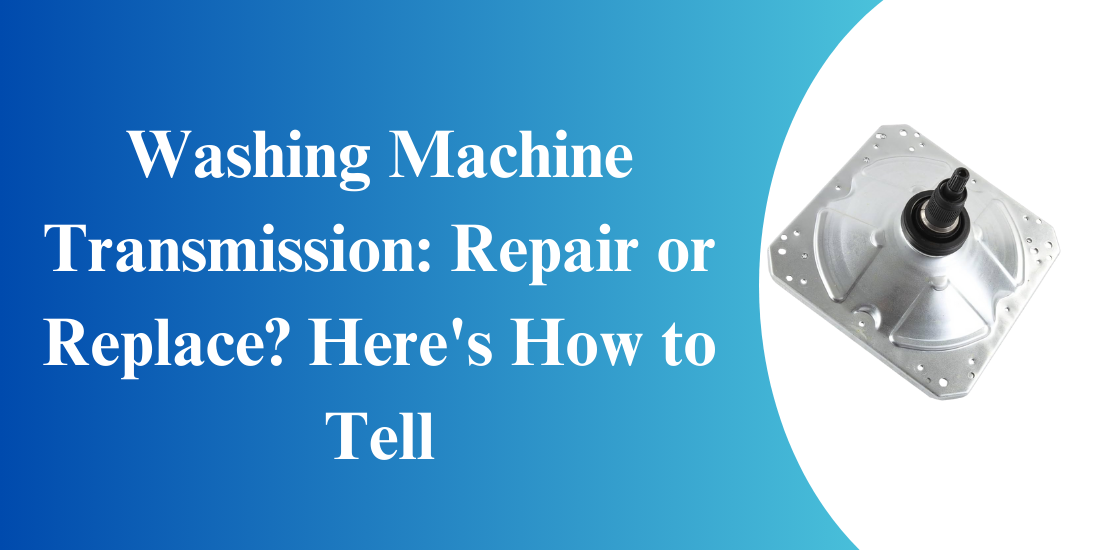
Washing machines are essential for efficient laundry routines, with the transmission playing a key role in controlling the drum’s movement during wash and spin cycles. However, like all components, the washer transmission can wear out over time, leading to issues such as poor agitation or failure to spin. If you’re facing transmission problems, you may wonder whether it’s better to repair or replace it. In this article, we’ll help you identify when a washing machine transmission needs repair or replacement and guide you toward the best decision for your appliance.
When the Washer Transmission Needs Repair or Replacement
Here are the most common indicators that suggest your washer transmission may need repair or replacement:
1.Washing Machine Fails to Agitate
One of the primary functions of the transmission is to control the agitator’s movement during the wash cycle. If your washing machine is not agitating the clothes, or the agitator is moving sluggishly or not at all, it could indicate a failure in the transmission. This is one of the most obvious signs that the transmission is not functioning properly.
Repair: If the problem is caught early, the transmission gears or other parts might be replaced, restoring the agitation function.
Replace: If the transmission is severely damaged or if the washer is old, it might be more cost-effective to replace the entire transmission.
2.The Washing Machine Doesn’t Spin or Spins Inefficiently
Another clear sign of a failing transmission is when the washing machine fails to spin clothes properly. A washing machine that doesn’t spin at all or spins slowly means that the transmission isn’t engaging the motor correctly to perform the spin cycle. This leaves your clothes soaking wet at the end of the wash.
Repair: A malfunctioning transmission can often be repaired by replacing worn-out parts like the agitator or clutch.
Replace: If the machine is old and other components are also worn out, replacing the transmission—or the entire machine—may be the more practical solution.
3.Strange Noises During Operation
When a transmission begins to fail, you may hear grinding, screeching, or clunking noises during the wash or spin cycles. These sounds usually occur due to broken or misaligned gears inside the transmission. If you hear unusual noises, it’s a sign that internal parts are not functioning smoothly and could lead to more serious problems if left unaddressed.
Repair: If the issue is caught early, replacing the damaged parts of the transmission might solve the problem and eliminate the noise.
Replace: If the damage is extensive and the washer is already aging, a full replacement might be needed.
4.Inconsistent Cycles or Extended Cycle Time
If your washing machine is taking longer than usual to complete its cycles or seems to be inconsistent in how it performs its wash and spin functions, it may indicate that the transmission is malfunctioning. A failing transmission may struggle to maintain the proper timing for the cycles, leading to delays or incomplete cycles.
Repair: A technician can usually fix minor issues with the transmission, such as misaligned gears or improperly timed components.
Replace: If the problem is widespread or caused by an aging transmission, replacing the part may be more cost-effective than frequent repairs.
5Fluid Leaks from the Transmission
Some washing machines use oil or lubrication to ensure smooth operation of the transmission. If you notice a fluid leak under your washer, it could be due to a faulty transmission seal. Without the proper lubrication, the transmission will fail to function properly, and continued use could cause permanent damage to the washer.
Repair: If the transmission is leaking, resealing and refilling it with lubricant might restore its function.
Replace: If the internal parts have worn down or rusted due to the leak, replacing the transmission may be the only solution.
Deciding whether to repair or replace your washer transmission depends on its condition, the age of your machine, and repair costs. If the transmission is still in good shape, a repair can be a cost-effective solution. However, if the transmission is beyond repair or the washer is old, replacement may be the better option. Consulting a professional technician will help you make the best decision to keep your washing machine running smoothly.
Written by Allen Rode for HnKParts, a trusted provider of high-quality appliance parts, offering a wide range of replacement components for washing machine, Dishwashers, and more.







